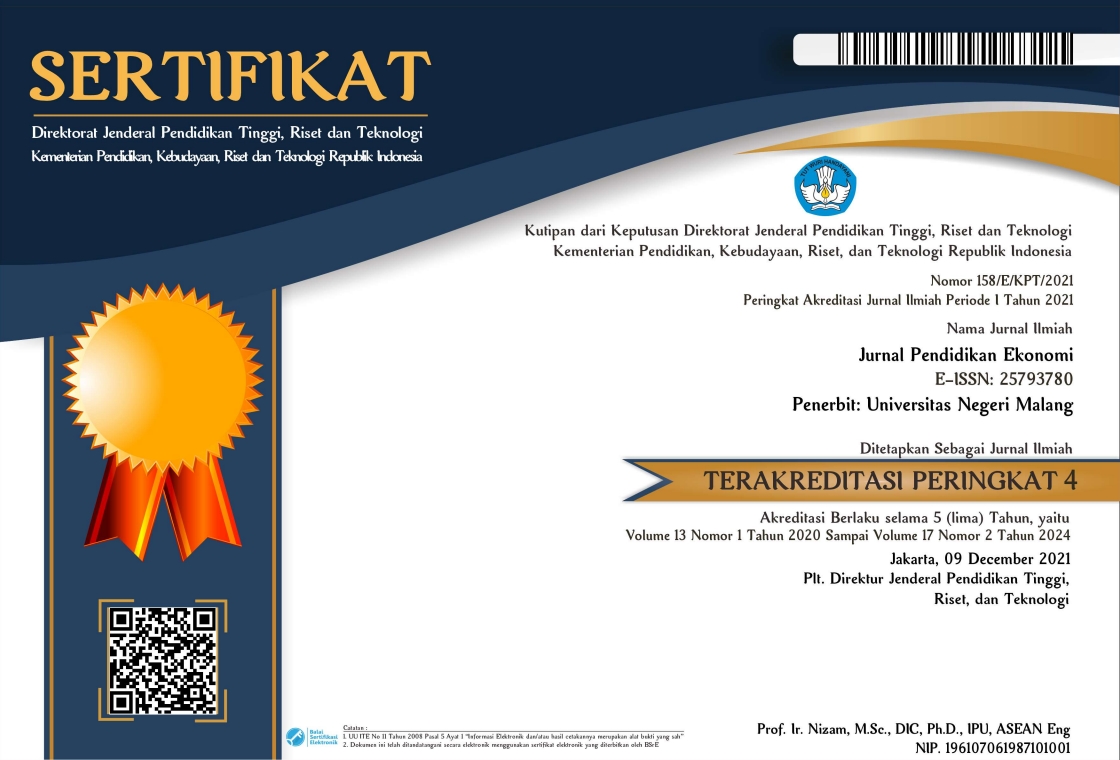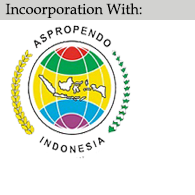The Future of Economic Education: Trends and Implications for Policy and Practice
Abstract
This study aims to systematically review the future of economic education and identify the trends and implications for policy and practice. This study adopted bibliometric analysis using VOSviewer software. The findings indicate that there has been a substantial movement over the last two decades regarding the theme of economic education. The top three countries—United States, Germany, and Indonesia contribute to this theme, whilst Universitas Negeri Malang, the University of Nebraska, and the University of Richmond are the three highest organizations that contributed to this scope during this period. The visualization from VOSviewer illustrates that the theme of economic education is linked with various dimensions. The frequency occurrence of this theme is often associated with financial literacy, pedagogy, pluralism, higher education, active learning, financial education, home economics education, teaching economics, economic literacy, heterodox economics, and entrepreneurship. The findings provide implications for concerning studies in this theme with a focus in shaping graduate students.
Keywords
Full Text:
PDFReferences
Allgood, S., & Bayer, A. (2016). Measuring college learning in economics. Improving quality in American higher education: Learning outcomes and assessments for the 21st century, edited by Richard Arum, Josipa Roksa, and Amanda Cook, 87–134. San Francisco, CA: Jossey-Bass.
Asarta, C. J., & Mixon Jr, F. G. (2019). Publishing and scholarship in economic education: A catalog and assessment. The American Economist, 64(2), 269–281. https://doi.org/10.1177/0569434519839228
Asarta, C. J., & Méndez-Carbajo, D. (2021). Bringing down the walls in Business and Management Education: A textual analysis of economic education articles. Journal of Education for Business, 96(1), 10–21. https://doi.org/10.1080/08832323.2020.1726268
Branco, M. C. (2018). Teaching political economy for human rights. International Journal of Pluralism and Economics Education, 9(3), 238–253. https://doi.org/10.1504/IJPEE.2018.093424
Budiwati, N., Hilmiatussadiah, K. G., Nuriansyah, F., & Nurhayati, D. (2020). Economic literacy and economic decisions. Jurnal Pendidikan Ilmu Sosial, 29(1), 85–96. https://doi.org/10.17509/ jpis.v29i1.21627
Corsini, L., & Giannelli, G. C. (2021). Economics education and financial literacy acquisition: Evidence from a field experiment. Journal of Behavioral and Experimental Finance, 32, 100556. https://doi.org/10.1016/j.jbef.2021.100556
Donthu, N., Kumar, S., Mukherjee, D., Pandey, N., & Lim, W. M. (2021). How to conduct a bibliometric analysis: An overview and guidelines. Journal of Business Research, 133, 285–296. https://doi.org/10.1016/j.jbusres.2021.04.070
Grimes, P. W., & Mixon Jr, F. G. (2021). Who publishes in economic education? A bibliographic analysis of the first 50 years of the Journal of Economic Education. The American Economist, 66(1), 137–159. https://doi.org/10.1177/0569434520974258
Haryono, A., Handayani, S., Satrio, Y. D., Munir, S., & Narmaditya, B. S. (2022). Economic learning education and financial literacy among Indonesian students. Pegem Journal of Education and Instruction, 12(3), 106–110. https://doi.org/10.47750/pegegog.12.03.12
Huzayran, F. M. (2023). The impact of economic education on economic literacy: A prospective study of a sample of respondents. Eximia, 12, 37–46. https://doi.org/10.47577/eximia.v12i1.332
Jüttler, M., & Schumann, S. (2022). The long-term effects of students’ economic competencies on the transition from school to university in the international context. Research in Comparative and International Education, 17(2), 196–224. https://doi.org/10.1177/17454999221086191
Longva, K. K., & Foss, L. (2018). Measuring impact through experimental design in entrepreneurship education: A literature review and research agenda. Industry and Higher Education, 32(6), 358-374. https://doi.org/10.1177/0950422218804912
Miragaya-Casillas, C., Aguayo-Estremera, R., & Ruiz-Villaverde, A. (2023). University students, economics education, and self-interest. A systematic literature review. International Review of Economics Education, 100266. https://doi.org/10.1016/j.iree.2023.100266
Mixon, F., & Cebula, R. (2014). New developments in economic education. Edward Elgar Publishing.
Mulyani, R., Thomas, P., & Widiyanto, W. (2018). The influence of student consumption, social status of family, the economic parent status, and the economic education of family to consumption behavior. Journal of Economic Education, 7(1), 24–30. https://doi.org/10.15294/jeec.v7i1.22190
Murti, A. W., Widjaja, S. U. M., & Rahayu, W. P. (2022). The influence of family economic education, lifestyle on consumption behavior through economic literacy in FEB UM Students. International Journal of Humanities Education and Social Sciences, 2(3), 1–13. https://doi.org/10.55227/ijhess.v2i3.299
Narmaditya, B. S., Sahid, S., & Hussin, M. (2023). How does family economic education foster students’ economic behavior? The mediating role of economic and entrepreneurial literacy. Heliyon, 9(5), e15608. https://doi.org/10.1016/j.heliyon.2023.e15608
Peterson, J. (2013). Economics education after the crisis: Pluralism, history, and institutions. Journal of Economic Issues, 47(2), 401–410.
Pol, E. (2013). Innovation and economic education: An integration. Working paper: University of Wollongong.
Salas-Velasco, M., Moreno-Herrero, D., & Sánchez-Campillo, J. (2021). Teaching financial education in schools and students’ financial literacy: A cross-country analysis with PISA data. International Journal of Finance & Economics, 26(3), 4077–4103. https://doi.org/10.1002/ijfe.2005
Salemi, M. K., & Siegfried, J. J. (1999). The state of economic education. American Economic Review, 89(2), 355–361.
Sharipov, F. F., Krotenko, T. Y., & Dyakonova, M. A. (2021). Digital potential of economic education: information technologies in a management university. Current Achievements, Challenges and Digital Chances of Knowledge Based Economy, 561–572. https://doi.org/10.1007/978-3-030-47458-4_65
Swinton, J. R., Conaway, B., & Clark, C. (2024). Recruiting via the core: A nontraditional introduction to economic thinking. The American Economist, 69(1), 135–147. https://doi.org/10.1177/05694345231218022
Tara, S. N., & Kumar, N. S. (2016). Primary and upper primary (1-8) education: initiative for the world of work at the primary and upper primary education in India. India: Preparation for the World of Work: Education System and School to Work Transition, 25–39.
Varum, C., Santos, E., & Afreixo, V. (2014). Recent trends and new evidence in economics literacy among adults. Journal of Economics and Economic Education Research, 15(2), 187–205.
Xu, X., & Xu, X. (2021). Innovation and entrepreneurship education: an empirical study. Innovation and Entrepreneurship Education in China: Responding to Social Change, 251–294. https://doi.org/10.1007/978-981-16-3724-7_5
Zhu, Y., Zafar, S. M., & Salahodjaev, R. (2022). Mitigations pathways towards sustainable development: assessing the influence of higher education on environmental quality in BRICS economies. Environmental Science and Pollution Research, 29(57), 86851–86858. https://doi.org/10.1007/s11356-022-21772-z
Zimmer, S. G. (2023). Rethinking the role of human capital in growth models. The Review of Austrian Economics, 36(4), 567–588. https://doi.org/10.1007/s11138-021-00561-w
DOI: http://dx.doi.org/10.17977/UM014v17i1p051
Refbacks
- There are currently no refbacks.

Jurnal Penddidikan Ekonomi is licensed under a Creative Commons Attribution-NonCommercial-ShareAlike 4.0 International License





